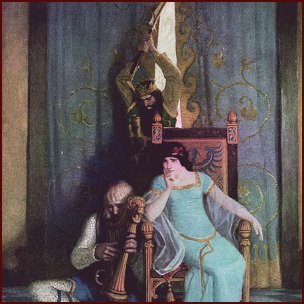English 380 - Love and Death: The Tristan
Tradition
(Spring, 2018)
 |
 Class meetings: T/Th 2:10-4:00
PM, Rm. 2-13 Class meetings: T/Th 2:10-4:00
PM, Rm. 2-13
Office:
47-35G, tel. 756-2636
Office Hours: M 8:10-10:00
AM, T/Th 12:30-1:30 PM,
and by appt.
[NOTE: some office hours may
be held in library; location
changes will be posted in
Announcements on PolyLearn] |
|
Dr. Debora
B. Schwartz
e-mail: dschwart@calpoly.edu
Main English
Office: 756-2597
|
|
 |

 Calendar of Assignments.
PLEASE NOTE that the on-line calendar (not any
print-out you may make) is authoritative. Assignments may be
modified in the course of the quarter. Check the on-line
calendar regularly (before each class) to ensure you are completing
the correct assignment.
Calendar of Assignments.
PLEASE NOTE that the on-line calendar (not any
print-out you may make) is authoritative. Assignments may be
modified in the course of the quarter. Check the on-line
calendar regularly (before each class) to ensure you are completing
the correct assignment.


 PREREQUISITES:
GE area A (esp. expository writing,
e.g. ENGL 134, and reasoning, argumentation and writing,
e.g. ENGL 145); AND GE area C1 (a 200-level literature
class, e.g. ENGL 230 or 231or 240 or 251 or 252 or 253).
Students enrolled in this class are assumed to have the basic writing,
argumentation and analytic skills taught in the Prerequisite
classes and to have prior experience in reading and analyzing
literature at the 200-level.
PREREQUISITES:
GE area A (esp. expository writing,
e.g. ENGL 134, and reasoning, argumentation and writing,
e.g. ENGL 145); AND GE area C1 (a 200-level literature
class, e.g. ENGL 230 or 231or 240 or 251 or 252 or 253).
Students enrolled in this class are assumed to have the basic writing,
argumentation and analytic skills taught in the Prerequisite
classes and to have prior experience in reading and analyzing
literature at the 200-level.
A
WRITING-INTENSIVE, G.E. AREA C4 CLASS. As a
writing-intensive class, ENGL 380 requires a minimum of
3000 words of writing over the course of the quarter, and 50% of
the course grade must be based on writing assignments. As a
G.E. area C4 class, it provides historical perspective
on one or more significant literary periods; covers a range of
literary genres and conventions; helps you understand both
individual works and their relationship to the social,
cultural, and historical context in which they were written,
including attention to relevant issues of gender and diversity;
and aims to foster an appreciation of the connections between
literary works and non-verbal forms such as the visual and
performing arts. Course readings, lectures and writing
assignments aim to help you develop the skills necessary to read
with insight, engagement, and detachment; to analyze and
evaluate works from cultures which are unfamiliar to you;
and to write clear, efffective textual analysis that is
firmly grounded in close reading of literary texts.
GWR: As a
C4 literature class, ENGL 380 may be taken by students wishing to
fulfill the Graduate Writing Requirement (GWR).
However, please be aware that successful completion of the course
does not guarantee GWR certification. To achieve GWR
certification, you must 1) have junior or senior standing;
2) pass the class with a grade of "C" or better (a C- is not
adequate); and 3) write a GWR-Certifiable
Essay on the essay portion of either the midterm
or the final exam. A GWR-certifiable essay must
conform to the standards for formal analytic writing about
literature: a valid argument (appropiate and
adequate content), logical organization, appropriate and adequate
textual support, and reasonably correct mechanics (grammar,
spelling, sentence structure, punctuation, etc.) and style.
See Tips for Writing a
GWR-Certifiable Essay; consult the formerly used Paper Writing Guidelines and
Essay Evaluation Sheet if you
are unsure about the conventions of formal analytic writing about
literature.

![Mac Harshberger, [Mark] Watched
Them as They Lay (1927 illustration to Bedier's Romance of
Tristan and Iseult)](MHWatched.jpg)
 COURSE DESCRIPTION and
OBJECTIVES:
COURSE DESCRIPTION and
OBJECTIVES:
ENGL 380, "Love and Death: The Tristan Tradition," is designed to
introduce students to a highly influential medieval love story
which has been eclipsed, in modern times, by the better known saga
of Lancelot and Guenevere. We will trace the development of
the Tristan tradition from the middle ages to the 21st century,
seeking to understand its ongoing appeal and to analyze the
significance it has held for various periods and audiences.
Of particular interest will be the treatment of the adulterous
triangle in each work and the author's characterization of the
protagonists: Tristan, nephew to King Marc of Cornwall, and
Isolde, lover of Tristan and Marc's queen. Material
considered will include artwork, film and an opera in addition to
literary works -- romance and lai, modern poetry and fiction --
from the medieval period through the 21st century. Students
will refine their expository writing skills and practice writing
analysis of literary texts and other art forms.

REQUIRED TEXTS: Some required
textbooks have been ordered and are available at the El Corral
bookstore. The five textbooks are inexpensive paperbacks; VERY
inexpensive copies can be found used at <bookfinder.com> or other
online booksellers. Do NOT substitute another edition or
translation for these textbooks:
Some required
textbooks have been ordered and are available at the El Corral
bookstore. The five textbooks are inexpensive paperbacks; VERY
inexpensive copies can be found used at <bookfinder.com> or other
online booksellers. Do NOT substitute another edition or
translation for these textbooks:
- Joseph B�dier, The Romance of Tristan and Iseult,
tr. Hilaire Belloc and Paul Rosenfeld (Vintage Classics); also
available online from Google
Books
- B�roul, The Romance of Tristan, tr. Alan S.
Fedrick (Penguin Classics)
- Gottfried von Strassburg, Tristan with the Surviving
Fragments of the Tristan of Thomas, tr. A.
Hatto (Penguin Classics)
- Chr�tien de Troyes, Arthurian Romances, tr.
William W. Kibler and Carleton W. Carroll (Penguin Classics)
- Steven Millhauser, The King in the Tree
(Vintage Books)
Other
required readings will be accessed
electronically: Online Readings are found in .HTML
files accessible through links on this website and E-reserve
readings in the form of .PDF files on "electronic reserve"
in PolyLearn. Please note that ALL required
electronically accessed readings should be available
to you in class either electronically or as printed
out hard copies which should be placed in a course
binder and BROUGHT WITH YOU TO CLASS.
- To access PolyLearn, log in
at MyCalpoly,
go to "My Courses" and select "ENGL 380" from the classes you
are taking. Click on the PolyLearn link and then on the links in
the Electronic Reserves section to download, read and/or print
the .PDF files using Acrobat Reader.
- To access online
readings in .html files, click on the link on the Calendar of Assignments. NOTE: some
online readings are from the text archive on the Camelot
Project website; you must write in LINE NUMBERS for poems
from this archive BEFORE the class meetings for which they are
assigned.
- ALWAYS BRING E-READER COPY OR HARD COPY OF ASSIGNED TEXTS
WITH YOU TO CLASS!
REQUIRED VIDEO SCREENINGS: We
will
also discuss several films which are on reserve for
ENGL 380 at the Kennedy Library Circulation Desk:
|
|
 We will also discuss a DVD of "Extended Scenes" from Richard
Wagner's Tristan und Isolde (the opera
was composed 1857-59; the DVD
presents excerpts from the 1976 production starring Jon
Vickers and Roberta Knie, with the Montreal Symphony
Orchestra, conducted by Franz-Paul Decker).
We will also discuss a DVD of "Extended Scenes" from Richard
Wagner's Tristan und Isolde (the opera
was composed 1857-59; the DVD
presents excerpts from the 1976 production starring Jon
Vickers and Roberta Knie, with the Montreal Symphony
Orchestra, conducted by Franz-Paul Decker).
These required films are the equivalent of
readings and must be viewed prior to the class
meeting at which they will be discussed. Group
screening times will be arranged, or you can see them on
your own time. Copies of each required video are on
Reserve for ENGL 380/459 in the Kennedy Library.
For each required film or
video, you must submit a video worksheet
electronically to your Polylearn Discussion Group and
bring hard copy with you to the class meeting
devoted to discussion of the film. Your five
video worksheets will not be graded as Written Work,
but they should be completed with care as the information
they ask you to compile is covered on the midterm and
final exams. Video worksheets factor into the Participation, Intellectual
Engagement and Collaboration component of your
final course grade: each missing Video
Worksheet counts as an Unexcused Absence.
NOTE 1: Videos and DVDs on reserve do not
circulate outside the library; they must be screened in
the library during normal library hours.
NOTE 2: Films which have been released on DVD
may be available from NetFlix, Hulu, Amazon's View on
Demand, and/or from local libraries or video stores.
NOTE 3: Only selected scenes from the films will be
screened in class; you must arrange to see the full
video prior to the class meeting at which it will be
discussed.
|
Remember: While films are fun, you
still have do do the readings! You will not pass this course
simply by watching the films.

 Communicating:
Communicating:
You are expected to have an email account and to check it
regularly. Important announcements will be sent via the
Announcements section of PolyLearn to your Cal Poly email address,
or I may contact you over the class
email alias. The
class email alias is automatically generated using the email
address of each enrolled student found in the Cal Poly Directory
server. If your Cal Poly email account is NOT your preferred email
address, you must
- Log into http://my.calpoly.edu/
and click on "Grades and Personal Information" (the "Personal
Information Channel") to change your Email Delivery Address.
Once you have done so, any email sent to your <username@calpoly.edu>
, including all postings to the class alias, will be forwarded
to the address you have designated.
You are responsible for information sent over the alias (e.g.
changes in class meetings or assignments), so be sure to check your
email regularly.

PREPARATION: The
assignment
for each class meeting is found on the on-line
calendar. All readings (and video screenings, as
applicable) are to be completed before the class meeting on
the day for which they are assigned. Unannounced quizzes will help monitor whether you
are keeping up with assigned readings. Quizzes will take
place during approximately the first 10 minutes of class; expect
them regularly. Please note that the on-line calendar
(not any printout you make) is authoritative. Assignments
may be changed or modified in the course of the quarter.
Check the on-line calendar regularly (before each class meeting)
to ensure that you are completing the correct assignment.
PARTICIPATION: ENGL
380 is designed to encourage YOUR interaction with and enjoyment
of the works we are studying. The primary emphasis is on the
texts, not historical background or scholarly debate, but some
familiarity with the historical and cultural context is
essential to an understanding of both medieval and modern works;
this context will be provided through assigned background
readings and lectures (and will be covered on quizzes and exams).
While ENGL 380 is lecture-based, your regular presence will make
a real difference in both your enjoyment of the material and the
success of the class. You are expected to interact with
classmates both during in-class group discussion activities
and through participation in a PolyLearn Discussion Group.
YOUR active participation is essential to the
success of ENGL 380!
For these reasons . . .
 REGULAR ATTENDANCE AND PARTICIPATION
IN YOUR POLYLEARN DISCUSSION GROUP ARE REQUIRED. Due
to the twice-weekly class meetings, any absence causes you to miss
a substantial chunk of material. Regular and
punctual attendance is required. Please note
that EVERY absence will affect the 20% of your course
grade that is based on Participation, Intellectual Engagement, and
Collaboration. Additionally, each missing Discussion Group
posting will be treated like an unexcused Absence, and will
affect the Participation,
Intellectual Engagement and Collaboration component of
your final grade, reducing it from a base of 4.0.
REGULAR ATTENDANCE AND PARTICIPATION
IN YOUR POLYLEARN DISCUSSION GROUP ARE REQUIRED. Due
to the twice-weekly class meetings, any absence causes you to miss
a substantial chunk of material. Regular and
punctual attendance is required. Please note
that EVERY absence will affect the 20% of your course
grade that is based on Participation, Intellectual Engagement, and
Collaboration. Additionally, each missing Discussion Group
posting will be treated like an unexcused Absence, and will
affect the Participation,
Intellectual Engagement and Collaboration component of
your final grade, reducing it from a base of 4.0.
If you have a valid reason for missing class (illness, family
crisis, other unavoidable conflict), TELL ME IN
WRITING. A written explanation, either in an email or
a hard copy note signed by you, is required for an absence
to count as excused; be sure to include your full name, the class
number, the date(s) missed, and the reason(s) for the
absence(s). Any absence for which you do not provide a
written explanation will be recorded as
unexcused.
PARTICIPATION,
INTELLECTUAL ENGAGEMENT AND COLLABORATION GRADE
CALCULATION:
Each student starts out with a
4.0 (A) for Participation, Intellectual Engagement and
Collaboration. This component of your final grade
drops by .1 for the first EXCUSED absence (4.0
to 3.9) and .2 for the second
excused absence
(3.9 to 3.7). Additionally, it drops .3 for the first UNEXCUSED absence;
the Unexcused Absence penalty increases by .1 for each subsequent
unexcused absence (from .3 to .4 to .5, etc.). Please
note that excused absences in excess of two (a full week,
10% of the class) count
the same as unexcused absences.
Please note that only
absences due to illness, family crisis, or circumstances which
are truly beyond your control
count as excused.
Deadlines for other courses, work conflicts, and job interviews
are NOT valid reasons for missing class; you are responsible for
keeping work commitments from conflicting with academic
ones. Exception: if you are a graduating senior and
must travel out of town for a final interview, ONE such absence
will count as excused. Please do not schedule local
interviews or other appointments during class meetings.
FOR AN ABSENCE TO BE EXCUSED, YOU MUST NOTIFY ME IN WRITING
(email preferred). On the subject
line, put your class
(ENGL 380), the
word absence,
and the day and date when you missed class (for example, "380
absence T 1/9/18"). Please repeat that information in the
body of your email and provide a full explanation of the
circumstances leading to your absence. (I must understand
why you needed to miss class in order to evaluate whether your
absence qualifies as excused.)
Online Conversations; Engagement
with the Texts and with Each Other. Attendance
is not the sole measure of your participation; I am also
interested in your intellectual engagement with the material and
your willingness to collaborate with your peers as
demonstrated by regular participation in class discussion and/or
in an online PolyLearn Discussion Group and through peer-editing
of written assignments.
While I notice and appreciate active participation
in class discussions, I don't like to penalize students who are
less comfortable speaking up in class. I therefore measure Intellectual
Engagement and Collaboration primarily based on out-of-class
participation in your assigned Discussion Group Forum,
to which you will submit 6 (ungraded) Mini-Essays (MEs), 12
(ungraded) Classmate Responses, and a series of five (ungraded)
film analysis worksheets. While these assignments are
not graded as Written Work, each ungraded assignment that is not
submitted to the Discussion Group Forum counts as an Unexcused
Absence and will negatively impact the 20% of your course
grade that is based on Participation, Intellectual Engagement, and
Collaboration.
You will be assigned to a PolyLearn
discussion group of 6-8 students to which you will
post a series of six short (2-pg.) Mini-Essays (=MEs).
Each time a mini-essay ("ME") is assigned, you are expected to read
the postings of the other members of your discussion group and to
post a thoughtful response of one-two paragraphs to
TWO of their ME postings. These Classmate Responses (=CRs)
must include additional textual evidence from the work under
discussion (other than the passages quoted in the ME to
which you are responding). Discussion group postings (both MEs
and CRs) will be graded pass/fail only, but they will be
factored along with Attendance into the 20%
Participation, Intellectual Engagement and Collaboration
component of your final course grade.
Missing postings from your Polylearn Discussion Group (six
Mini-Essays; twelve Classmate Responses; five film responses) COUNT
AS UNEXCUSED ABSENCES.

GRADED
WORK:
 There will be periodic unannounced SCANTRON
READING QUIZZES, so bring a scantron form (long enough for 15-20
questions) to each class meeting. Quizzes will
monitor whether you are keeping up with assigned readings and/or
film screenings; they are also intended to motivate you to learn background
information as we go along and to serve as exam prep
review sheets for the objective component of the midterm and final exams. For this
reason, you will keep quizzes to use as study guides and
turn in only the scantron form; scantron scores will be reported
in the Grades section of PolyLearn.
There will be periodic unannounced SCANTRON
READING QUIZZES, so bring a scantron form (long enough for 15-20
questions) to each class meeting. Quizzes will
monitor whether you are keeping up with assigned readings and/or
film screenings; they are also intended to motivate you to learn background
information as we go along and to serve as exam prep
review sheets for the objective component of the midterm and final exams. For this
reason, you will keep quizzes to use as study guides and
turn in only the scantron form; scantron scores will be reported
in the Grades section of PolyLearn.
Quizzes will include factual questions (names, titles,
dates, genres, key terms) based on the Text/Film Information
on the Calendar of Assignments and the information covered in
required background readings and lectures.
There will also be IDs of and questions about key passages/scenes,
names, motifs, and episodes from the assigned works. If you
learn the basic facts about each day's assigned works as we go
along -- title of work(s); author, composer or director's name;
date of composition / production; original language of work; genre
and form of literary works; etc. -- you should do well on quizzes
(and have a much easier task when it's time to review for exams!)
Quiz Grading: Each quiz will
consist of at least 15 questions, but will be scored as if there
were only 10 questions. This means, in essence, that there
are 5 or more Bonus questions on every quiz -- questions
for which credit is awarded if you get them right, but no penalty
is subtracted if you get them wrong. Thus, answering 9 of 15
questions right on a "10-pt." quiz earns a score of "90%";
answering 11 of 15 (or more) earns a score of "110%"; etc. Careful
quiz prep will provide a cushion of EC points to balance any
missed (or less than stellar) quizzes. Students with a quiz
average higher than 100% on the "10-pt." quizzes at the end of the
quarter will receive grades in the A+ range (4.05 to 4.3
on a 4.0-scale) for the 15% of the final course grade based upon
quizzes. This quiz policy is designed to give students an
incentive to keep up with readings and learn background
material incrementally rather than trying to "cram" before
exams. It is not uncommon to finish the quarter with a quiz
average well above "100%."
- NOTE 1: No make-up quizzes will be given. If you
miss a quiz, you will get a copy to use as a study guide for
exams.
- NOTE 2: No extra time will be given to late-comers --
so come to class promptly!
- NOTE 3: I will drop the lowest quiz score from your
average, and Bonus pts. are available on every quiz, so
you can make up for a weak or missed quiz by preparing well for
subsequent quizzes.

--  WRITING ASSIGNMENTS: because ENGL
380 is a writing-intensive GE class,
at least 50% of your course grade must be based on written
work. The out-of-class writing
assignments will be of two sorts:
WRITING ASSIGNMENTS: because ENGL
380 is a writing-intensive GE class,
at least 50% of your course grade must be based on written
work. The out-of-class writing
assignments will be of two sorts:
1) Six ungraded, two-page Polylearn Discussion
Group Mini-Essays [= "MEs"] and twelve ungraded,
1-2 paragraph Classmate Responses [= "CRs"].
Ungraded Discussion Group postings count towards your Participation,
Intellectual Engagement and Collaboration grade AND are
REQUIRED in order to receive credit for GRADED PAPER, a
3-page revision/expansion of ONE 2-page ME (counts for 15% of your
final course grade). Both MEs and CRs will require close
reading of supporting quotations from assigned texts.
2) A GRADED 3-page paper which is a Revision/Expansion of ONE
Discussion Board ME.
MINI-ESSAY LOGISTICS:
Each student will be assigned to a Polylearn Discussion
Group of 6-8 students. You must post six two-page
MEs to
your Polylearn Discussion Group by no later than
midnight on the dates indicated on the Calendar of Assignments (three MEs
before and three after the midterm exam).
Based upon Discussion Group CR feedback, optional visits to the
Writing Center, conversations with your instructor during an Office
Hour, and/or peer editing sessions, you will revise one
ME and submit it in hard copy for instructor feedback and
a grade.
-- MINI-ESSAY SPECIFICS:
These short assignments are designed to make you attentive to
details in the works under discussion. They should be narrowly focused on
topics that can be covered within the two-page target length.
The two-page target length will also oblige you to get to the point (lead with your
conclusion; articulate your claims
fully and explicitly; avoid broad statements and
generalities; no "hook!"); to cut out unnecessary wordiness ("dead wood"); and to express your
ideas clearly and concisely.
MEs may be a response to a study question, an analysis of how a
specific aspect of a work helps communicate an author or
director's message or intentions, or a comparison of a specific
element with an analogous element in a previously assigned
work. Regardless of the topic you choose, mini-essays MUST
include analysis and
interpretation of carefully chosen citations from the
text. An effective ME uses close reading
of carefully chosen
textual evidence to support an interpretive claim about
the text or film. You will need a narrow focus so
that you can really "unpack" the language and/or images in the
scenes and passages you discuss without exceeding the
two-page target length. Careful analysis of a
single character, a specific relationship, a key image, or an
important scene or speech may be enough to fill two pages.
MEs should present a logically
organized argument to demonstrate the validity of an explicitly stated
interpretive claim; don't simply describe characters
or relationships or summarize the
plot. HINT: It may be fruitful to analyze how an element
in the work differs from the way it appears in
other versions of the Tristan story and to consider the effects
of the transformation. Or, explore how a key image
or theme is presented in a limited number of passages or
scenes. Close attention to specific imagery, word
choice, etc. in a single descriptive passage or significant
scene may be enough to fill your two-page target length!
Whatever you decide, your MEs must be grounded in
close reading: interpretive analysis
of specific passages and scenes.
For fuller details, see the Mini-Essay Assignment
Guidelines and the Essay Evaluation
Checklist. NOTE: You should familiarize yourself
with this checklist before you start to write, and take care to
avoid the issues and errors that are included on the Checklist and in the Grading Codes!
POSTING GUIDELINES: Mini-Essays are due no later
than midnight on the Fridays indicated on the
Calendar of Assignments. The text of your Mini-Essays must be pasted
into the message field of your Discussion Group posting so
that classmates can respond to it in a Discussion thread.
Additionally, you must attach your ME as a .docx
file so that I can
easily access the first draft of the MEs submitted for a
grade and evaluate the changes made during the revision
process.
-- IMPORTANT: in order to
receive credit for each ME, you must post at least two short
(but thoughtful) Classmate
responses [= "CRs"] to MEs posted by two
members of your Polylearn Discussion Group (with whom you may
agree or disagree, as long as you do so respectfully and back up
your response with your own textual support). CRs
must including at least one ADDITIONAL quotation from the text
(i.e. a quotation that was not included in the ME to which you are
responding) in support of your observations. CRs are due no
later than midnight on the Sundays indicated on the
Calendar of Assignments.
Your twelve CRs submitted over the course of the quarter
will not be graded as Written Work, but they are required to
get credit for your six ungraded ME postings AND for the
graded paper; additionally, CRs, like MEs, factor into the Participation,
Intellectual Engagement and Collaboration component of
your final course grade. You must post two CRs to
receive credit for each of your MEs. Each missing ME and each missing CR
counts as an Unexcused Absence.
GRADED WRITING ASSIGNMENT:
Because effective writing is the result of an ongoing process of
revision, the three-page Paper you submit for a grade should be a
carefully edited revision/expansion of an ME
submitted to your PolyLearn discussion group; it must cover
substantial new ground and should be 50% longer (three pages)
than your initial 2-page ME posting. (Even the
strongest writing can be improved through the revision
process.)
To allow time for thoughtful revision and careful editing, hard
copy of an ME submitted for a grade will not be accepted
earlier than a week after CRs have been posted.
Students are encouraged to discuss their ideas with Dr. Schwartz
during an office hour, take a draft of their ME to the University
Writing Center, and/or get additional feedback from a friend or
classmate who is familiar with the conventions of writing about
literature (or who has read and understands those conventions, as
articulated in the ME
Guidelines, the Paper
Guidelines formerly used for the final paper in ENGL
380, and the Essay Evaluation
Checklist) prior to submitting the revised ME for
grading.
-- ONE of your two-page Mini-Essays will be revised and expanded
to a three-page graded paper which must be turned in in
hard copy, along with a hard-copy print-out of the original
ME that has been peer-edited by another
member of your Discussion Group. This carefully
edited revision/expansion is worth 15% of your course
grade. To allow time for careful revision and editing,
the revised/expanded ME submitted for grading must be submitted at
least one week after Classmate responses have been posted. The
header for the revision should begin "Revised ME #: Title."
--  IMPORTANT:
in order to receive credit for your Mini-Essays, you must post at
least two short (but thoughtful) Classmate Responses [=
"CR"] to the MEs posted by two other members of your Polylearn
Discussion Group (with whom you may agree or disagree, as long as
you do so respectfully and back up your response with your own textual
support from the play). CRs must including at least
one ADDITIONAL quotation from the play (that was not cited in the
ME to which you are responding) in support of your
observations. Classmate responses are due no later than
midnight on the the dates indicated on the Calendar of Assignments (generally, 2
days after Mini-Essays are due).
IMPORTANT:
in order to receive credit for your Mini-Essays, you must post at
least two short (but thoughtful) Classmate Responses [=
"CR"] to the MEs posted by two other members of your Polylearn
Discussion Group (with whom you may agree or disagree, as long as
you do so respectfully and back up your response with your own textual
support from the play). CRs must including at least
one ADDITIONAL quotation from the play (that was not cited in the
ME to which you are responding) in support of your
observations. Classmate responses are due no later than
midnight on the the dates indicated on the Calendar of Assignments (generally, 2
days after Mini-Essays are due).
Your twelve classmate responses will not be graded as
Written Work, but they are required to get credit for your
Graded Paper and they factor into the Participation, Intellectual Engagement,
and Collaboration component of your final course
grade: each missing Classmate
Response counts as an Unexcused Absence.
Additionally, your peer-editing of the first draft of the essay
revised and submitted for credit by another member of your
Discussion Group is REQUIRED; failure to peer-edit the ME of ONE
member of your Discussion Group WILL COUNT AS AN UNEXCUSED
ABSENCE.
There are two Peer-Editing
assignments (which each student must complete for ONE other
member of her/his Discussion Group). The first is
"dry-run" peer edit of ME 1 which ALL students will complete and
turn in to Dr. Schwartz. The second, "official" Peer Edit
will be completed for a classmate as part of her/his revision
process prior to submitting her/his expanded/revised paper for a
grade. Both Peer Edits require the Peer Editor to fill out a
hard copy print-out of the Essay Evaluation Checklist
available as a printer-friendly document on Polylearn (a
print-out of the Essay Evaluation
Checklist webpage will not be accepted); to write
corrections and editing suggestions on the first draft of
the ME under revision using the Error Codes at the bottom
of the Essay Evaluation Checklist; to CIRCLE on that checklist
ALL error codes used in peer-editing the first draft ME; and
to write an end comment that points to strengths
and/or weaknesses of the ME and provides at least one
suggestion for what new material to include while expanding the
paper to three pages.
On the front of the hard-copy check-list, the Peer Editor's name
must be clearly indicated ("Feedback by NAME") along with the name
of the person whose ME is being responded to ("Feedback to NAME");
also indicate your Discussion Group number. If the names are
not included, the Peer Editor will not receive credit for this
required assignment.
On the front of the hard-copy check-list, the Peer Editor's name
must be clearly indicated ("Feedback by NAME") along with the name
of the person whose ME is being responded to ("Feeback to NAME");
also indicate your Discussion Group number. If the names are
not included, the Peer Editor will not receive credit for this
required assignment.
Your Graded paper counts for 15% of your final course grade.
Because revised MEs will not be accepted earlier than a
week after CRs have been posted, students choosing to
revise an ME submitted in weeks 8 or 9 may not have finished their
revisions by the final class meeting. In that case, the
revised ME should be submitted as a .docx (or .doc) file sent as
an email attachment.
An ME submitted for grading via email at the end of the
quarter MUST:
- be sent from your Cal Poly email account;
- include your name, the class number (ENGL 380) and the date at
the top of the first page (above the paper title), just as you
would on a paper submitted in hard copy; have a title, centered,
after the header; and include a bibliographic citation for the
work(s) you have cited at the end of the paper;
- be saved as a Word file under the file name "[yourlastname]380paper.docx"
(or .doc);
- IMPORTANT: The subject line of the email used to
submit the paper should read "[Your Last Name] ENGL 380 paper."
- In the body of your email, be sure to include a TELEPHONE
NUMBER where I can reach you if I have problems opening
the file.
EXAMS will cover
readings, lectures, and required films.
- A two-hour Midterm exam
on day 1 of week 6 (closed book, in class, on T 5/8/18).
- A three-hour Final
(closed book, semi-cumulative, but with greatest emphasis on
works read since Midterm) on T 3/22/18, from 4:10-
7:00 PM.
Both exams will include an essay on which you may try for GWR certification. Essays will be
worth 50% of exam points; the remaining 50% will be
for the objective portions of the exam. Expect factual
questions (T/F, matching, multiple choice) about assigned works
(including required critical essays and background readings) and key
concepts covered in lectures and background materials. There will
also be Passage IDs and possibly Item IDS: choosing from a
list of key names, objects, motifs and/or episodes, you will
identify the work(s) in which the item appears and explain its role
and significance in each of these works. The Final Exam will be semi-cumulative,
but with emphasis on material covered since the Midterm exam.
FINAL EXAM TIME:
The three-hour, closed-book Final
Exam will take place on T 3/22/18, from 4:10-
7:00 PM. You must take the exam at the scheduled time.
KEEP THIS DATE IN MIND WHEN MAKING END-OF-QUARTER TRAVEL PLANS!





COURSE GRADE
CALCULATION: 20%: Intellectual Engagement and Collaboration (more concrete
than the general term "participation"), based on class attendance (20 class meetings); 2 (ungraded)
peer-edits of a classmate's ME (all students will
submit a peer-edit for ME 1; each student will submit a
peer-edit of ONE other ME that a classmate is revising
as his or her final, graded paper); and
the following ungraded submissions to the assigned
Discussion Group forum: 6
(ungraded) MEs, 12 (ungraded) Classmate
Responses, and 5 (ungraded) video
worksheets.
15%: quizzes (lowest
score dropped). If quiz average is more than 6 pts., a
bonus of .05 to .3 will be added to the normally top score of
4.0. (4.0=A, 3.7=A-, 3.3=B+, etc., as in computing GPA)
15%: Graded
Revision and Expansion to Three Pages of ONE 2-page Polyearn
Discussion Group Mini-Essay. Your carefully edited, revised and expanded paper
may NOT be identical to your initial ME posting ; you must cover
significant new ground in the additional page of the
essay. To receive credit for the graded, revised ME, you
must turn it in along with hard
copy of
the original
2-page ME posting, which must be peer-edited by one other
Discussion Group member. Peer-editing requires:
1) written corrections and notations on the hard copy ME, using
the grading codes on the Essay Evaluation Checklist posted on
PolyLearn; 2) a final comment addressing strengths of the ME and
offering at least one suggestion for revision/improvement; and
3) filled out hard copy of the Essay Evaluation Checklist (.PDF
file available on PolyLearn). Be sure that the name of
both the essay writer and the Peer Editor is found on BOTH the
hard copy of the first draft ME AND the Essay Evaluation
Checklist filled out by the Peer Editor.
 |
20% |
Intellectual
Engagement and Collaboration (more
concrete than the general term "participation"),
based on class attendance
(20 class
meetings); 2 (ungraded)
peer-edits of a classmate's ME (all students
will submit a peer-edit for ME 1; each student
will submit a peer-edit of ONE other ME that a
classmate is revising as his or her final,
graded paper); and the
following ungraded submissions to the assigned
Discussion Group forum: 6 (ungraded) Mini-Essays, 12 (ungraded) Classmate Responses, and 5 (ungraded)
Video Worksheets. |
| 15% |
Quizzes (for quiz score
calculation, please see note
below!) |
| 15% |
One three-page
graded paper, a Revision/Expansion of ONE PolyLearn
Discussion Group Mini-Essay. Your carefully
edited, revised and expanded paper may NOT be identical
to your initial ME posting; because the target length is
50% longer than the originally posted ME, you must cover
significant new ground in the additional page of the
essay. To receive credit for the graded, revised
ME, you must turn it in along with hard copy of the original 2-page ME
posting, which must be peer-edited by one other Discussion
Group member. Peer-editing requires:
1) written corrections and notations on the hard copy
ME, using the grading codes on the Essay Evaluation
Checklist posted on PolyLearn; 2) a filled out hard copy
of the Essay Evaluation Checklist (.PDF file available
on PolyLearn); and 3) a final comment addressing
strengths of the ME and offering at least one
suggestion for revision/improvement (written on the
back of the Essay Evaluation Checklist).
Be sure that the name of both the essay writer and the
Peer Editor is found on BOTH the hard copy of the first
draft ME AND the Essay Evaluation Checklist filled out
by the Peer Editor. |
20%
|
Midterm
Exam (100-pt. Objective Exam and 100-pt. Essay)
|
| 30% |
Final Exam
(150-pt. semi-cumulative Objective Exam and 150-pt. Essay)
Note 1: Because this is a C4 writing-intensive
course, 50% of points on each exam are for the
essay.
Note 2: The Exams component of final course
grade will be calculated by adding together the total
number of pts. earned on the Midterm and Final Exams and
dividing by 500, the total number of exam pts.
|
A NOTE ON QUIZ SCORES:
Remember that quiz points and exam points are not equivalent,
since the percent scores awarded on quizzes have been
artificially inflated (an average of 10 correct answers on
quizzes with 15-20 questions is recorded as a quiz score of "100%"
rather than the actual percent score, 66% or below). A score
of 100% on a 100-pt. objective midterm means 100 of 100 exam
questions are correct, while "100%" on a "10-pt." quiz means 10 of
15-20 quiz questions are correct -- and quizzes are worth
significantly less than exams.
You therefore cannot calculate your final course grade
directly from the raw percentage grades earned on quizzes and
exams. For this reason (and also because so many
students finish the quarter with quiz averages above "100%"!), I
convert the scores on all components of the class to a 4.0-scale
(4.3=A+, 4.0=A, 3.7=A-, 3.3=B+, etc.) before calculating the final
course grade.
Everyone whose quiz average is more than 10 pts. per
quiz will receive a bonus in the form of a quiz
grade of above the normal maximum grade of 4.0. The amount
of this bonus (from .05 to .3) will be commensurate with the
strength of the quiz average relative to other students in the
class.

 OH MY
GOSH . . . CAN I HANDLE THIS CLASS??
OH MY
GOSH . . . CAN I HANDLE THIS CLASS??
Sure you can -- if you do the readings! Because not
all readings are equally long, look ahead to plan your time.
Finally. . . remember that I LOVE teaching this stuff, and I'm
told that my enthusisam makes my classes more fun.
And WHAT ABOUT THOSE TWO-HOUR BLOCKS?
Rest assured, we'll take a break each day. Feel free to
bring along a caffeinated (or non-caffeinated) drink -- whatever
it takes to keep you alert through two hours. If there is
sufficient interest, rotating cookie duty can be arranged!
WELCOME, AND ENJOY!!!

A Note on Academic Integrity:
Cheating includes (but is
not limited to) sharing or discussion of quiz passages
or exam questions with students who have not yet taken a
quiz or exam; making copies of materials that are not
allowed to circulate (e.g. graded or ungraded exams); or
any other use of course materials from a previous
quarter that gives you an advantage over other
students without your Instructor's knowledge and
explicit permission. Incidents of Cheating
will be reported to the Office of Academic Affairs
and may result in a Failing Grade.
Plagiarism is a serious
offense. I expect
that you understand what constitutes plagiarism and how to
correctly use and cite information in your papers. In its most basic
definition, plagiarism means 1) passing off someone else's
work as your own or 2) taking ideas and/or words from others
without properly citing them.
In this class, you may refer to ideas or concepts defined in
lectures and on my web pages without citing the lectures and
web pages explicitly, since I consider that information and
these concepts to be "yours" to use freely (provided that
you do not copy language directly from my pages). The
writing assignments in this class should cite ONLY the
Shakespeare's texts, not secondary sources or critics.
Both ungraded MEs and the graded ME revision/expansion paper
should cite only the play itself and offer
arguments grounded in close reading of the text. It is
unlikely that students who adhere to these guidelines might
inadvertently commit plagiarism in this class.
I strongly recommend
that you do NOT consult other online resources for
"help" as you grapple with these texts, since in my
experience, students using these sites have been most
prone to inadvertent (and occasionally deliberate)
plagiarism. If you DO consult such materials,
you MUST list these resources in a "Works Consulted"
section of your ME or graded Paper.
Please note that a Work Consulted listing, along with the
normal Work Cited listing, will cut significantly into the
already limited room you have to make your argument (no
more than 2 pp. for an ME or 3 pp. for the
revised/expanded graded paper). It is to your
advantage to complete the assignments as they are
intended; the online resources you may find will not
typically help you complete these assignments
successfully, and the consequences of even inadvertent
plagiarism are high.
That said, if you
are unsure of how to avoid plagiarism in your papers, you
should talk to me before you turn in the paper. Turning
in a writing assignment completed in whole or in
part by another individual, or adapted
from another individual's work, is
plagiarism. If
you are caught plagiarizing in this course, you will
fail the course and you may be expelled
from the university. Finally,
you may not turn in a paper you completed for another class
for credit in this class; similarly, you cannot turn in work
completed in this class for credit in any other class
without obtaining express permission from that professor.
For
your convenience, I am including below the language from Cal
Poly's Academic Integrity policy (CAP 681; see
<http://www.osrr.calpoly.edu/plagiarism/> ):
"Cal
Poly will not tolerate academic cheating or plagiarism in
any form. Academic dishonesty is
addressed both as an academic issue and as a disciplinary
incident under the CSU Standards for Student Conduct.
[. . .] Plagiarism is defined as the act of using
intentionally or unintentionally the ideas or work of
another person or persons as if they were one�s own
without giving proper credit to the source. Such
an act is not plagiarism if it is ascertained that the ideas
were arrived through independent reasoning or logic, or
where the thought or idea is common knowledge.
Acknowledgement of an original author or source must be made
through appropriate references, i.e., quotation marks,
footnotes, or commentary. Examples of plagiarism
include, but are not limited to, the following: the submission
of a work, either in part or in whole, completed by
another; failure to give credit for ideas,
statements, facts or conclusions which rightfully belong to
another; failure to use quotation marks [. . .] when quoting
directly from another, whether it be a paragraph, a
sentence, or even a part thereof; close and lengthy
paraphrasing of another�s writing without credit
or originality; and use of another�s [paper],
project or [. . . ] part thereof without giving
credit. Submitting the same project to multiple instructors
as a unique creation may also be considered plagiarism. A
project produced for another class must be cited just as
when citing any other source. Prior to resubmitting work
from a previous course, a student must receive explicit
written permission from the instructor of the current
course. A project produced for another class must also be
cited just as when citing any other source."
Additionally, you should be aware that sharing information
about reading quizzes and/or exams with students who have
not yet completed the quiz or exam is a violation of Cal
Poly's rules concerning Academic Integrity. If
you are caught sharing information about quiz or exam
questions, you will fail the course and you
may be expelled from the university.
Contents of this and all linked pages Copyright Debora B.
Schwartz, 2004-2018

Return to Dr. Schwartz's Teaching
Page

 Class meetings: T/Th 2:10-4:00
PM, Rm. 2-13
Class meetings: T/Th 2:10-4:00
PM, Rm. 2-13 



![Mac Harshberger, [Mark] Watched
Them as They Lay (1927 illustration to Bedier's Romance of
Tristan and Iseult)](MHWatched.jpg)

 Some required
textbooks have been ordered and are available at the El Corral
bookstore. The five textbooks are inexpensive paperbacks; VERY
inexpensive copies can be found used at <
Some required
textbooks have been ordered and are available at the El Corral
bookstore. The five textbooks are inexpensive paperbacks; VERY
inexpensive copies can be found used at <



 Communicating:
Communicating:

 There will be periodic unannounced SCANTRON
READING QUIZZES, so bring a scantron form (long enough for 15-20
questions) to each class meeting. Quizzes will
monitor whether you are keeping up with assigned readings and/or
film screenings; they are also intended to motivate you to learn background
information as we go along and to serve as exam prep
review sheets for the objective component of the
There will be periodic unannounced SCANTRON
READING QUIZZES, so bring a scantron form (long enough for 15-20
questions) to each class meeting. Quizzes will
monitor whether you are keeping up with assigned readings and/or
film screenings; they are also intended to motivate you to learn background
information as we go along and to serve as exam prep
review sheets for the objective component of the  WRITING ASSIGNMENTS: because ENGL
380 is a writing-intensive GE class,
at least 50% of your course grade must be based on written
work. The out-of-class writing
assignments will be of two sorts:
WRITING ASSIGNMENTS: because ENGL
380 is a writing-intensive GE class,
at least 50% of your course grade must be based on written
work. The out-of-class writing
assignments will be of two sorts: 




 OH MY
GOSH . . . CAN I HANDLE THIS CLASS??
OH MY
GOSH . . . CAN I HANDLE THIS CLASS?? 